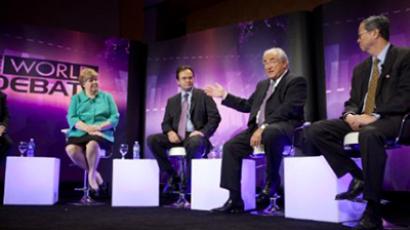PIMCO's Mohamed El-Erian predicts QE3
A third round of quantitative easing (QE3) is coming from the Fed. The Eurozone as we know it is close to collapse — and there isn’t all that much that central banks or governments can do about it.
Regardless, the world economy still looks to grow slightly in 2012, according to PIMCO CEO Mohamed A. El-Erian.Mohamed A. El-Erian is pessimistic about the future of the Eurozone. While he says that there are indeed some chances for a recovery, it would take a lot of effort on behalf of policy makers — and that’s exactly what he’s not sure about. El-Erian says there is a “significant possibility” of a worst-case scenario coming to fruition, which would be, as he explains, “the Eurozone fragments completely.”Back in America, El-Erian predicts that the US Federal Reserve will step up to the plate and unveil a third round of quantitative easing, but he also tells RT that the benefits aren’t everything the world would hope for.The problem, says El-Erian, is a misunderstanding of global economics only worsened by poor policy and politics.“I think that part of the problem is that the more the Fed uses a largely ineffective policy instrument, the more the balance tips from benefits to cost and risks,” El-Erian tells Capital Account’s Lauren Lyster. As with QE2, says El-Erian, America saw the Fed increased prices of shares, but at a cost that also brought a surge in commodity prices, which in turn undermines both production and unemployment. “So there are consequences and I think the Fed at the end of the day will probably go along with QE3, but the benefits will be small in relative to the costs and the risks,” adds El-Erian.Why, then, would Federal Reserve Chairman Ben Bernanke take the risk? According to El-Erian, the move will come as a last-ditch effort to persuade the American public that the US isn’t incapable of keeping the country out of this mess. So far, however, America has barely been able to prove such. “The Fed does not want to be perceived as inactive,” says El-Erian. “The Fed does not want to be characterized as not responding to America’s unemployment crisis, even though the Fed knows that it cannot deliver the outcomes, it has to engage.”That’s not to say that the Fed is solely to blame for America’s standing. El-Erian adds that elsewhere in America, government offices are dropping the ball on every attempt to improve the economy. “In the US, the treasury is asleep, the housing agency is asleep, the infrastructure agency is asleep or not doing very much on the employment front,” says El-Erian. In the end, he says, it comes down to two dire truths: the Fed is the only game in town, but at the same time it does not have good enough policies to push America back on track immediately. The outcome, says El-Erian, will without a doubt come to the markets, but for the greater economy it won’t be as lucky. “Expect the Fed to be active, but don’t expect the Fed to be effective when it comes to economic outcomes,” says El-Erian.














